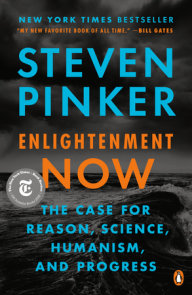


This progress is not the result of some cosmic force. Instead, follow the data: In seventy-five jaw-dropping graphs, Pinker shows that life, health, prosperity, safety, peace, knowledge, and happiness are on the rise, not just in the West, but worldwide. Is the world really falling apart? Is the ideal of progress obsolete? In this elegant assessment of the human condition in the third millennium, cognitive scientist and public intellectual Steven Pinker urges us to step back from the gory headlines and prophecies of doom, which play to our psychological biases. If you think the world is coming to an end, think again: people are living longer, healthier, freer, and happier lives, and while our problems are formidable, the solutions lie in the Enlightenment ideal of using reason and science. He conducts research on language, cognition, and social relations writes for publications such as the New York Times, The Guardian, Time, and The Atlantic and is the author of twelve books, including The Language Instinct, How the Mind Works, The Blank Slate, The Stuff of Thought, The Better Angels of Our Nature, The Sense of Style, Enlightenment Now, and Rationality: What It Is, Why It Seems Scarce, Why It Matter s. Steven Pinker is the Johnstone Family Professor in the Department of Psychology at Harvard University. Listen to the conversation and find out what happens when an expert on the human mind sits down to discuss intelligence in machines with two data scientists! Do we think rising platforms like ChatGPT are going to be running the world anytime soon? Does technology not only have the ability to be intelligent, but also rational? In this episode we get the pleasure of discussing these issues with Steven Pinker, an experimental cognitive psychologist and a popular writer on language, mind, and human nature. This month, we are diving into the important and currently hot topic of artificial intelligence.


 0 kommentar(er)
0 kommentar(er)
